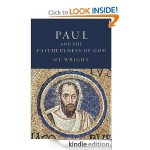Tom Wright is suggesting, that in a very real sense, Paul is the first Christian theologian. In particular he wants to stress that Paul had to rethink his second temple theology in light of Christ, the Spirit, and in particular in light of the cross and resurrection. Paul realized that if it took the crucifixion of the Messiah to deal with the fundamental human problem, then the problem must have been far worse than previously imagined. The problem could not be reduced to the idolatry and immorality of pagans, nor could the solution be Israel doing her proper job of sharing Torah and shedding light on the pagan world. Indeed, as Paul came to believe the problem ran right through Israel and back to Adam— namely the problem of endemic sin was far worse than previously imagined. Israel was in Adam, and as such had no chance of becoming the light of the world.
This leads to an in depth analysis of Rom. 1.18-2.16 at the close of the monotheism chapter (pp. 264-73). Rejecting the previous analyses which suggested that Rom. 1.18 should be separated from Rom. 1.16-17, partly on the grounds that gar is regularly for Paul a substantive connector, including in Romans 1, he insists that therefore God’s righteousness and the revelation of God’s wrath must be connected. In his view, 1.18 does not explain how the righteousness is revealed (Dodd thought it was revealed in the immorality and idolatry of pagans) but rather why that revelation was necessary (p. 265). No, wrath is a response to such sin.
Much as I love rhetorical analysis of Romans, Wright is correct that Douglas Campbell is barking up the wrong tree when he argues for Rom. 1.18ff. being an example of speech in character of a hypothetical Jewish opponent of Paul. This doesn’t work, for, in contrast to what we find in Rom. 7, there is no change of voice, or precursor warnings that someone else is speaking here.
Wright correctly insists that Paul is saying that the future wrath of God is revealed NOW, and what is revealed is that that judgment will be enacted by the Messiah himself (p. 767). While I certainly agree with that as far as it goes (see 2 Cor. 5.10 for example), I am stunned that he doesn’t also say that the ‘now revelation’ involves what we learn from Christ’s death on the cross. The death on the cross is indeed the first installment if you will of God’s wrath, God’s judgment on sin, with Christ being the sin bearer. There is an already and not yet to this wrath of God, this final judgment of God, and neither the future judgment nor the cross exhaust it.
The problem involved sin, as disease that was a pandemic, infecting all human hearts, but also Sin a cosmic power, according to Wright that held the world in thrall. The solution needed to be big enough to deal with both aspects of sin.
I am heartened by Tom’s recognition that Rom. 1.18-26 has echoes of the story of Adam. His point could have been sharpened had he known about the doctoral dissertation by Dr. Brian Kidwell done here at Asbury in which he comprehensively goes over all the Adamic allusions, echoes, quotations in Romans, and finds them from first to last in this book (e.g. at the end in Rom. 16 the crushing of Satan under the foot). Israel, unfortunately is as much in Adam as the pagans. This leads to the conclusion on p. 770 about what is said in Rom. 2– “At the level of the heart, the Jew is no different from anybody else.” Israel itself was in a hopeless condition. Therefore, God’s purposes for humankind as well as his purposes for Israel are ultimately the same, but since Israel cannot fulfill the task for which it was chosen, Christ, the true Israelite must do so, as light of the world, changer of hearts, send of the Spirit etc. The next chapter will deal in detail with Israel, election, the people of God.














